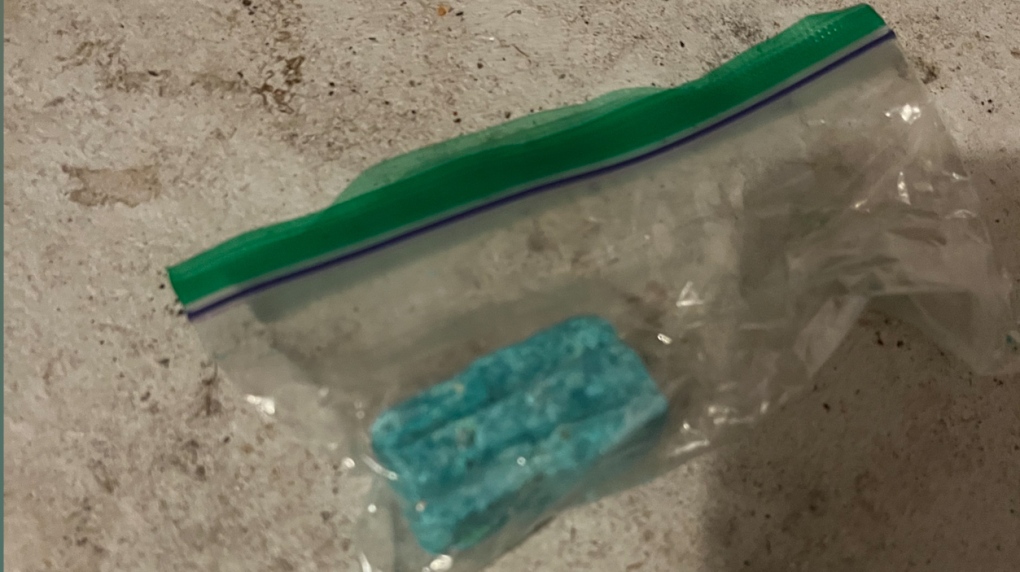Group calls on province to ban rat poison after Kanata dog nearly dies
After a dog in Kanata nearly died from ingesting rat poison, a grassroots organization is calling on the provincial government to take action to prevent similar incidents from happening.
Ally, who asked CTV News not to use her last name, says last Thursday she took her four-year-old Yorkie named Winston for a walk in their Kanata neighbourhood.
- Sign up now for daily CTV News Ottawa newsletters
- The information you need to know, sent directly to you: Download the CTV News App
"It's been a really awful experience," said Ally. "It's made me a lot more leery, when I used to feel comfortable and safe here in our neighbourhood."
During the walk, she says Winston picked up a blue block that turned out to be rat poison.
"We rushed him immediately over to the emergency vet where they had to induce vomiting and give him IV fluids and all sorts of medication and bloodwork to try and stabilize him," Ally said. "It was a really awful experience."
 A sample of the rodenticide picked up by Winston, a 4-year-old dog, while out on a walk with his owner, Ally. (Supplied)
A sample of the rodenticide picked up by Winston, a 4-year-old dog, while out on a walk with his owner, Ally. (Supplied)
She says the poison was found near a retirement home, but she's not sure how it got there.
The owner of Brookside Retirement Living, Christine Forget, says the home has a contract with Orkin for pest prevention and has several bait boxes on its property.
"After I learned about it this morning, I instantaneously called our pest control provider," said Forget. "I'm going to be doing an investigation. We are really concerned because pets are really important to us."
Orkin tells CTV News it follows strict guidelines and checked the bait boxes on the property which were still intact.
Although, the company says there are times when rodents will pull the poison from the boxes.
"These so-called tamper-resistant boxes are not tamper resistant," said Allison Hansen, co-founder of Rodenticide Free Ontario. "We've seen many pictures of rodents like eastern gray squirrels or even raccoons that have chewed holes in the bait boxes."
The organization is calling on the province to ban the sale and use of rodenticides, which are readily available for purchase and used by many companies.
"They are incredibly inhumane. It takes days to over a week to kill the intended target. As they die slow, painful deaths, they spend more time out in the open making them easy prey for wildlife," Hansen said.
"It's proven its incredibly dangerous and [rodenticides are] making their way into all levels of the food chain, from cities, in the water, to our prey birds."
As for Ally, the incident cost her more than $2,000 in vet bills and she is hoping her story helps raise awareness.
"We're not doing enough to protect the most vulnerable people, our kids, our pets and animals," she said.
CTVNews.ca Top Stories

Firefighters battle to control devastating Los Angeles wildfires as ferocious winds calm somewhat
A fast-moving fire broke out in the Hollywood Hills on Wednesday night, threatening one of Los Angeles' most iconic spots as firefighters battled to get under control three other major blazes that killed five people, put 130,000 people under evacuation orders and ravaged communities from the Pacific Coast to inland Pasadena.
Canada could impose tariffs on U.S. steel, orange juice in response to Trump threat
Canadian officials are narrowing a list of American products to target in the event the federal government must respond to U.S. tariffs on Canadian goods, CTV News has confirmed.
Can the U.S. really make Canada the 51st state?
Talk of Canada becoming the 51st American state has raised an existential question on this side of the border: Could it be done? Could the maple leaf make way to the stars and stripes? According to several experts, it may be possible, but not painless.
'On the front line': Quebec planes and B.C. helicopters battle L.A. wildfires
Water-bombing pilots and crews from Quebec and a British Columbia company have been grappling with high winds and heavy turbulence in the battle against massive Los Angeles wildfires, as Canadians with homes in the area are forced to flee fast-moving flames.
Convicted Jan. 6 rioter arrested as fugitive in Whistler, B.C.
An American citizen convicted of participating in the Jan. 6, 2021, riot on Capitol Hill who said he was seeking asylum in Canada has been arrested as a "fugitive from U.S. justice," according to authorities.
NEW Tipping guide to Canada: When, where and how much to tip for restaurants, taxis and more
CTVNews.ca has created an entirely unofficial guide to tipping in Canada to help visitors, newcomers and curious Canadians navigate the shifting social norms of when, where and how much to tip.
Canadians want Ottawa and provinces to team up against Trump tariff threats: Nanos survey
A majority of Canadians want Ottawa and the provinces to team up against U.S. tariff threats, according to a new survey by Nanos Research.
L.A. wildfires continue to devastate area, Canada prepared to offer expertise
A series of wildfires are searing through the Los Angeles area, forcing many to evacuate their homes. Here's everything that happened throughout Jan. 8.
Lisa Kudrow recently found a note Matthew Perry left for her in a ‘Friends’ prop
Lisa Kudrow has revealed that she recently found a note that Matthew Perry left inside a 'Friends' prop for her 20 years ago.

































